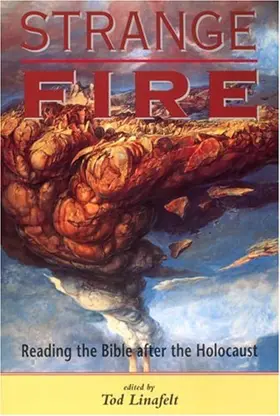

Strange Fire: Reading the Bible after the Holocaust
Strange Fire addresses the implications of the Holocaust for interpretation of the Hebrew Bible, bringing together a diverse and distinguished range of contributors, including Richard Rubenstein, Elie Wiesel, and Walter Brueggemann, to discuss theoretical and methodological considerations emerging from the Shoah and to demonstrate the importance of these considerations in the reading of specific biblical texts. The volume addresses such issues as Jewish and Christian biblical theology after the Holocaust, the ethics of Christian appropriation of Jewish scripture, and the rethinking of biblical models of suffering and sacrifice from a post-Holocaust perspective.
The first book of its kind, Strange Fire will establish a benchmark for all future work on the topic.
- Table of Contents
- Matters of survival : a conversation - Elie Weisel, Timothy K. Beal
- Rupture and context : the ethical dimensions of a post-Holocaust Biblical hermeneutics - Chris Boesel
- Rabbinic Bible interpretation after the Holocaust - B. Barry Levy
- A fissure always uncontained - Walter Brueggemann
- The Hebrew Bible in the framework of Christian-Jewish relations in post-Holocaust Germany - Rolf Rendtorff
- Of faith and faces : Biblical texts, Holocaust testimony and German 'after Auschwitz' theology - Björn Krondorfer
- Beyond totality : the Shoah and the Biblical ethics of Emmanuel Levinas - O.E. Ajzenstat
- Edmond Jabès and the question of death - Matthew del Nevo
- Avraham, Emil and Andre : re-reading Avraham's Monologue with the divine in light of Fackenheim and Neher - Steven L. Jacobs
- Banality and sacrifice - Roland Boer
- Written in stone : Biblical quotation in the United States Holocaust Memorial Museum - Jennifer L. Koosed
- Am I a murderer? Judges 19-21 as a parable of meaningless suffering - Katharina von Kellenbach
- 'Isaiah 'twas foretold it' : helping the church interpret the prophets - Patricia K. Tull
- Isaiah and theodicy after the Shoah - Marvin A. Sweeney
- The covenant with death - Francis Landy
- Job and Auschwitz - Richard L. Rubenstein
- Job and post-Holocaust theodicy - Stephen Kepnes
- Zion's cause : the presentation of pain in the Book of Lamentations - Tod Linafelt
- Death as a beginning of life in the Book of Ecclesiastes - Mark K. George.
Inner Books
This physical volume has several internal sections, each of which has been reviewed independently
- A fissure always uncontained by Walter Brueggemann
- Matters of survival : a conversation by Elie Weisel and Timothy K. Beal
- Rupture and context : the ethical dimensions of a post-Holocaust Biblical hermeneutics by Chris Boesel
- Rabbinic Bible interpretation after the Holocaust by B. Barry Levy
- The Hebrew Bible in the framework of Christian-Jewish relations in post-Holocaust Germany by Rolf Rendtorff
- Of faith and faces : Biblical texts, Holocaust testimony and German 'after Auschwitz' theology by Björn Krondorfer
- Beyond totality : the Shoah and the Biblical ethics of Emmanuel Levinas by O. E. Ajzenstat
- Edmond Jabès and the question of death by Matthew del Nevo
- Avraham, Emil and Andre : re-reading Avraham's Monologue with the divine in light of Fackenheim and Neher by Steven L. Jacobs
- Banality and sacrifice by Roland Boer
- Written in stone : Biblical quotation in the United States Holocaust Memorial Museum by Jennifer L. Koosed
- Am I a murderer? Judges 19-21 as a parable of meaningless suffering by Katharina von Kellenbach
- 'Isaiah 'twas foretold it' : helping the church interpret the prophets by Patricia K. Tull
- Isaiah and theodicy after the Shoah by Marvin A. Sweeney
- The covenant with death by Francis Landy
- Job and Auschwitz by Richard L. Rubenstein
- Job and post-Holocaust theodicy by Stephen Kepnes
- Zion's cause : the presentation of pain in the Book of Lamentations by Tod Linafelt
- Death as a beginning of life in the Book of Ecclesiastes by Mark K. George
